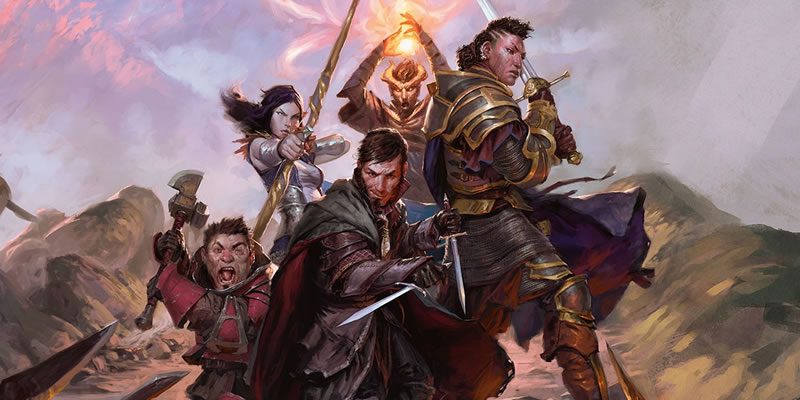UA: Greyhawk Initiative Breakdown

Several weeks ago in Twitter, Mearls explained a variant initiative system that he had been playing round with, and today in Unearthed Arcana, he has explained it in full so that people will stop arguing about a piecemeal presentation of it. Just to get this out of the way, I disliked it in its initial presentation, but assumed there were some safeguards in the system that I didn’t know about. It turns out that there’s one safeguard I didn’t know about, but otherwise it’s what he originally presented. I do not recommend this for anyone, unless what you like on your turn is the frustration of invalid actions. Um, spoiler for the rest of this article, I guess.
The Core of the Idea
At the start of each round, characters decide what they’re going to do, declare it, and roll the initiative dice appropriate to the action. Actions proceed from lowest roll to highest. The d4 goes to missile fire, followed by movement, swapping gear, and miscellaneous actions with a d6, followed by melee attacks at d8, and finally spellcasting at d10. If you’re doing more than one of these, such as moving and attacking, add them together. If you also do something as a bonus action, add that die in too. Resolve all of your actions together once your number finally comes around.
So that’s the first problem I want to dig into. Classes vary hugely in the complexity of their action economy, to say nothing of subclasses. After their first round, barbarians mostly stop using their bonus actions, and ideally don’t even have to move all that much (unless they’ve picked up that first Eagle Totem feature, which is super good but radically changes their gameplay). Missile weapon characters – though not bow rogues, who need to be Hiding fairly often – do great with this. Two-weapon-fighting types, paladins who cast their various smite spells, clerics who cast a bonus action spell and a cantrip, monks who should always be using their bonus actions… these characters take it on the chin with this system, and will usually go very late in a round.
The sales pitch for this whole idea comes out and says that it adds complexity with the intention of creating more drama in each round. I think that really under-sells the amount of complexity it adds, while all of the drama I can see in the examples is “will someone else’s action invalidate my whole plan?” or “did I take on an unnecessary initiative penalty?” Let’s see what some of those complications are.
Who Lives in the Details?
The devil himself, of course. Or possibly an arcanaloth. Anyway, spell durations are the first big issue, since “until the end of your next turn” is hugely variable if you’re rerolling initiative every round. This system constrains that variability by changing “until the end of your next turn” to “until the end of the next round.” That’s functionally a backstop to give you a standardized expectation. Oh, but “until the start of your next turn” becomes “until the start of the next round,” which is a huge difference and nerf to any relevant effects. “Until the start of your next turn” is a way to make sure that all of your allies have a chance to capitalize on it, even if you don’t; this takes that promise away completely.
Surprise works a little differently: you add +10 to your initiative result, and carry the “surprised” condition until the end of the round, but it seems that you do act in the opening round.
Dexterity doesn’t modify initiative in this system, except that high Dex wins ties in initiative, and a number of other initiative-modifying features have special handling to plug into this system. The bard’s Jack of All Trades feature no longer adds half their proficiency bonus to Dex checks for initiative, but reduces your die size for any action by one step. Advantage or disadvantage to initiative applies only to the largest die in your initiative pool.
For some reason, the system decides that ranged attacks are simple or fast, while everything else is complicated or slow. Considering slings, firearms, and heavy crossbows are all ranged attacks, I have a real hard time seeing this – after all, if we’re trying to simulate things, shouldn’t we simulate reloading? What I’m trying to say is, missile weapons getting to be fast doesn’t make sense to me overall. This presumes a particular starting state for a character in a round that is strangely different from the starting state of a melee attacker. Do you start the round ready to do the very last step of the attack, or do you start the round just beginning your windup and aiming? I’m emphatically not a serious simulationist, but given the likelihood of no enemy in range to attack, splitting melee and missile attacks into two separate options blocks off one avenue toward making sure you can do something.
The Ready action, and readied actions, are not part of this system, but Delay comes back in. If you want to give away the benefit of a good initiative roll, the system lets you, and you can treat “someone else is juuust about to act” as a trigger for you to act instead. Used properly, this is… super annoying, please use this only sparingly.
If you can’t act because you’re incapacitated at the start of the round, any effects that resolve at the end of your turn (such as saving throws to purge conditions, or death saves) resolve at the end of the round instead. This is a net benefit to the side with more healing, giving the cleric just a touch more time to save your butt.
There’s also special handling for situations where one creature chooses another creature’s actions, as with dominate effects.
Groups of monsters of the same type that are doing the same thing use the same initiative, which helps a tiny bit. As events unfold and their actions differentiate more in response to player actions, well, complexity expands.
Obviously – so obviously that I mention it only for completeness – this system adds another decision-making and die-rolling step to combat, and any time it saves in decision-making later on, it expends (and then some, I expect) on the players planning and making their decisions for the round.
The Takeaway
Any initiative system that requires two and a half pages of text to explain, and to cover problematic use cases, is pretty overcomplicated. See also the egregious case of AD&D 1e initiative rules, broken down into gruesome detail here. Mearls cops to the fact that it’s way more complicated than a lot of groups need, both in the document and in the Dungeon Life video. Listening to Mearls talk about the system and how he’s thinking about design in the 5e space is fairly compelling – and revealing.
Mearls talks about this system testing well with his home group and at GaryCon, including a staggeringly large group of 16 players. His verbal explanation of how it works when he uses it differs from what’s in the document, though. He talks about announcing the first monster initiative, asking who goes before that, and letting everyone under that number resolve actions collectively. That’s… not well supported in the text, and creates a lot more maneuvering room to make sure players don’t get stuck with no available action.
The examples in the document display a lot of the system’s rougher edges, even lampshading them, and I appreciate Mearls not pretending those issues won’t come up. The main problems are that:
- Some classes always have a more expensive action economy than others.
- You’ll often add a d6 to your pool for the privilege of moving, and turn out not to need it.
- When you don’t add a d6 to your pool for the privilege of moving, you will absolutely need it. Since you also didn’t plan ahead to swap your weapon, you’re just SOL.
- (What they don’t mention: disarming effects are super-powerful because you probably didn’t add a d6 for the Swap Weapons or Scramble Around Picking Up Your Weapon.)
For me, it’s the third of these that is the total dealbreaker and why I would never run this system or play in a game that used it. The tension of wondering if my action will just be invalidated by someone else’s action before I can act, and I can’t change my plan to fit… yeah, no thanks. There are plenty of ineffective rounds already in D&D – attacks miss, targets pass their saving throws against cantrips, whatever. A system where I’m fairly likely to get an Action Invalid – Try Again Later response bothers me enough that I can’t see past it to what anyone likes about this system.
Mearls does say one thing about the system’s less-intended effects that I find interesting, at least. He describes players making and executing a plan rather than operating as individuals; that’s a wash to me, because that means I need to be ready to cut off one player quarterbacking one or more others, without the consent of the latter. (With consent, it’s basically fine. Without, it’s ugly social pressure from someone with self-asserted tactical or system mastery.) That’s not the intriguing part.
He says that this makes each round into a discrete microfiction. Instead of rounds working as a flowing cycle, there’s a full stop that gives players a chance to huddle. Because they talk, they make more connected plans. New stakes get more clearly established, as the end of the round acts as a snapshot. His example is the drama of a monster critting the wizard, the wizard being in dire need of help… and the monster acting again before anyone can do anything about it, because it rolled well on initiative, they rolled poorly (and probably had to move to do anything useful), and boom, dead wizard. (Did you notice a sign on this sarcophagus that said “Dead Wizard Storage”?) This is dramatic, sure, but I’m not sure the drama of the wizard’s allies never having a chance to react is great for things like player agency. The more of the system that he touts, the more his examples rest on inducing players to roll more initiative dice or waste actions to make sure someone acts quickly.
At least he isn’t planning on pushing this into the core of the system. He’s talking about a lot of future UA articles being essentially similar blocks of variant rules or subsystems, rather than new content bundles – so more like the 3.5 UA rather than the 1e UA. I’m great with seeing Unearthed Arcana function as a hacker’s workshop, even if not everything is quite my deal.
Now, I also spent a bunch of time talking about initiative recently, over in Harbinger of Doom. My variant approaches are a hard march in the opposite direction from what Mearls is offering here. If you agree with my take on Greyhawk Initiative, maybe you’ll find something more to your liking in my blog.
One last thing – since I first came to D&D during 2e, I’m deeply amused to see my old friends and interlocutors, Rath, Rupert, and Delsenora, in text once again. Hey, y’all, it’s been a long, long time. Glad to see you’re still trying to kill that fucking troll.



